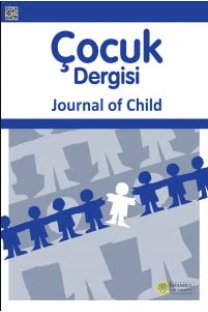Miyoklonus-opsoklonus-ataksi ile başvuran nöroblastom vakası
Oküler hareket bozuklukları, Paraneoplastik sendromlar, sinir sistemi, Miyokloni, Nöroblastom, Ataksi
A neuroblastoma case who presented with myoclonus-opsoclonus-ataxia
Ocular Motility Disorders, Paraneoplastic Syndromes, Nervous System, Myoclonus, Neuroblastoma, Ataxia,
___
- 1.Vukelic D, Bozinovic D, Norovic C, et al. Opsoclonus-myoclonus syndrome in a child with neuroborreliosis. J Infect 2000; 40:189-91.
- 2.Plantaz D, Michon J, Valteau-Couanet D, et al. Opsoclonus-myoclonus syndrome associated with non-metastatic neuroblastoma. Long-term survival. Study of the French Society of Pediatric Oncologists. Arch Pediatr 2000; 7: 621-8.
- 3.Rodriguez-Barrionuevo AC, Caballero-Morales MA, Delgado-Marques MP, et al. Kinsboume syndrome: review of our cases. Rev Neurol 1998; 26: 956-9.
- 4.Parisi MT, Hattner RS, Matthay KK, et al. Optomized diagnostic strategy for neuroblastoma in opsoclonus-myoclonus. J Nucl Med 1993; 34: 1922-6.
- 5.Talon P, Stoll C. Opsomyoclonus syndrome in children. A new case. Review of the literature (110 cases). Pediatrie 1985; 40: 441-9.
- 6.Corrias A, Nurch AM, Rossi G, et al. Opsoclonic encephalopaty in childhood (Kinsboume syndrome). Pediatr Med Chir 1985; 7: 437-41.
- 7.Cooper R, Khakoo Y, Matthay KK, et al. Opsoclonus-myoclonus-ataxia syndrome in neuroblastoma: histopathologic features-a report from the Children's Cancer Group. Med Pediatr Oncol 2001; 36: 623-9.
- 8.Hay ward K, Jeremy RJ, Jenkins S, et al. Long-term neurobehavi-oral outcomes in children with neuroblastoma and opsoclonus-myoclonus-ataxia syndrome: relationship to MRI findings and anti-neuronal antibodies. J Pediatr 2001; 139: 552-9.
- 9.Rudnick E, Khakoo Y, Altunes NL, et al. Opsoclonus-myoclonus-ataxia syndrome in neuroblastoma: clinical outcome and antineuronal antibodies-a report from the Children's Cancer Group Study. Med Pediatr Oncol 2001; 36: 612-22.
- 10.Noetzel MJ, Cawley LP, James VL, et al. Anti-neurofilament protein antibodies in opsoclonus-myoclonus. J Neuroimmunol 1987; 15:137-45.
- 11.Connolly AM, Pestronk A, Mehta S, et al. Serum autoantibodies in childhood opsoclonus-myoclonus syndrome: an analysis of antigenic targets in neural tissues. J Pediatr 1997; 130: 878-84.
- 12.Boltshauser E, Deonna T, Hirt HR. Myoclonic encephalopaty of infants or 'dancing eyes syndrome'. Report of 7 cases with long-term follow-up and. review of the literature (cases with and without neuroblastoma). Helv Paediatr Acta 1979; 34: 119-33.
- 13.Hiyama E, Yokoyama T, Ichikawa T, et al. Poor outcome in patients with advanced stage neuroblastoma and coincident opsomyoclonus syndrome. Cancer 1994; 74: 1821-6.
- 14.Heyer R, Hamann J, Offner G, et al. Myoclonic encephalopathy in childhood . Monatsschr Kinderheilkd 1977; 125: 640-5.
- 15.Altunes NL, Khakoo Y, Matthay KK, et al. Antineuronal antibodies in patients with neuroblastoma and paraneoplastic opsoclonus-myoclonus. J Pediatr Hematol Oncol 2000; 22: 315-20.
- 16.Gambini C, Conte M, Bernini G, et al. Neuroblastic tumors associated with opsoclonus-myoclonus syndrome: histological, immunohis-tochemical and molecular features of 15 Italian cases. Virchows Arch 2003; 442: 555-62.
- 17.Cohn SL, Salwen H, Herst CV, et al. Single copies of the N-myc oncogene in neuroblastomas from children presenting with the syndrome of opsoclonus-myoclonus. Cancer 1988; 2: 723-6.
- 18.Pranzatelli MR. Opsoclonus-myoclonus syndrome. Division of child-adolescent neurology.
- 19.Maeoka Y, Maegaki Y. Hyperexcitability of the blink reflex in a child with opsoclonus-myoclonus syndrome. No To Hattatsu 1998; 30: 323-7.
- 20.Koh PS, RalTensperger JG, Berry S, et al. Long-term outcomes in children with opsoclonus-myoclonus and ataxia and coincident neuroblastoma. J Pediatr 1994; 125: 712-6.
- 21.Russo C, Cohn SL, Petruzzi MJ, et al. Long term neurologic outcome in children with opsoclonus-myoclonus associated with neuroblastoma: a report from the Pediatric Oncology Group. Med Pediatr Oncol 1997; 28: 284-8.
- 22.Swart JF, de Kraker J, van der Lely N. Metaiodobenzylguanidine total-body scintigraphy required for revealing occult neuroblastoma in opsoclonus-myoclonus syndrome. Eur J Pediatr 2002; 161: 255-8.
- 23.Dalmau J, Porta-Etessam J. Paraneoplastic cerebral syndromes with oto-neuro-ophthalomologic manifestations. Rev Neurol 2000; 31: 1213-9.
- 24.Gumbinas M, Gratz ES, Johnston GS, et al. Positive gallium scan in the syndrome of opsoclonus-myoclonus treated with adrenocorticotropic hormone. Cancer 1984; 54: 815-6.
- 25.Palacio M, Ruiz-Benito MA, Mondragon F, et al. Infantile myoclonic encephalopathy with opsoclonus and neuroblastoma. Apropos of 2 cases. An Esp Pediatr 1983; 18: 118-22.
- 26.Musarella MA, Chan HS, DeBoer G, et al. Ocular involvement in neuroblastoma: prognostic implications. Ophthalmology 1984; 91: 936-40.
- ISSN: 1302-9940
- Yayın Aralığı: Yılda 4 Sayı
- Başlangıç: 2000
- Yayıncı: İstanbul Üniversitesi
Demir eksikliği anemisi ve zeka üzerine etkileri
Leyla AĞAOĞLU, Oktay TORUN, Yasemin SEFİL, Dilek DEMİR, Emin ÜNÜVAR
Yenidoğanın gastrointestinal perforasyonları
Mustafa OKUMUŞ, Tansu SALMAN, Alaaddin ÇELİK, Abdülkerim TEMİZ, Hüseyin ÖZBEY, Feryal GÜN
Alt solunum yolu infeksiyonu olan çocuklarda yatış süresi ile ilişkili faktörler
ELİF ÇOMAK, Ahmet R. ÖRMECİ, Sema KIRBIYIK, Ayşen TÜREDİ
Travmatik doğum vakalarının değerlendirilmesi
Konjenital müsküler tortikolis: Erken ve yoğun fizyoterapide aile uyumu ile tedavi başarısı
Erhan GÜLTEKİN, Özahi İlke İPEK, Cengiz ÇELİKYURT, Cavit AYDOĞDU, Semra YAPICI
Pınar TURHAN, Aysel KIYAK, Nur CANPOLAT, Nuray A. AYAZ, Belgin T. AKTAŞ, Gönül AYDOĞAN, Orhan KORKMAZ, Güngör TEKOĞUL, Işın KILIÇASLAN, Veli UYSAL, Seyhun SOLAKOĞLU
Göknur CANDEMİR, M. Emin ORHAN, Mustafa GÜLGÜN, Fuat TOSUN, S. Ümit SARICI, Rıdvan AKIN, Erdal GÖKÇAY
Kostmann sendromu: Vaka sunumu
YALÇIN ÇELİK, Bahar SALİHOĞLU, Sami HATİPOĞLU, Aysun KARADAĞ, Vefik ARICA
Primer hipomagnezemi: Vaka sunumu
